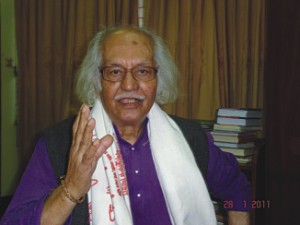
Inside
|
The Meaning of Liberation
How do you evaluate the spirit of the language movement in today's society?
One important aspect of the language movement is not always kept in mind. The language movement had, in its broader view, much more than earning a universal prestige for Bangla, our mother tongue. That larger view, which is often lost sight of, embraces a number of things -- liberation, not from the domination of a foreign language but liberation from poverty, from ignorance, from backward-looking thoughts, liberation from superstition and unscientific attitude of mind and, from the positive side, enhancement of liberal humanistic values. From the larger context I'm afraid our language movement has failed to achieve what we all wanted it to achieve. Unless these are achieved, I would say that the language movement has not achieved its potential that it had.
How can these be achieved?
Obviously it has to be a multi-pronged attack which should embrace not the furtherance of our language but many other things. Some of the most important areas that come to my mind are eradication of poverty and ignorance from the living conditions of the people. Unless we can provide, not a rich meal, but simply a square meal for survival to the millions of our poor people, high-sounding talk about the dignity of our mother tongue is meaningless. We can proceed in some ways; providing the people a reasonably good education is one of them. In this regard, I can say that in the National Education Policy 2010, for the first time, we introduced some fundamental elements. For example, we have clearly said that in the primary stage, which we would like to take up to Class 8, no formal religious education will be imparted in schools. There is no bar to teaching religious education at home, in the mosques or in the churches, but school, particularly at the elementary stage, is not the place for giving religious education. The only religious education that should be given is the education for humanism, where a young boy or girl will learn about humanism and not about the rituals of religion. We have been paying much attention to formal religious teaching, ignoring the basic teachings of human love and brotherhood.
How do you see the development of Bangla as a language?
There are many ideas and opinions about developing one's or any other language. Personally I think scholars and persons who are conversant with this issue have something to contribute. But my personal belief is that language has to be allowed to grow and develop in its own way. Any direction from an external source about how one's language should develop is not desirable. It's like a flowing stream of a river. There will be boulders in between but the river's stream crosses those boulders and runs on. In the same way, language will have to cross the various boulders that it will find in its path. In its own way, it will be able to cross those boulders and flourish in the flowing waters of language.
How important is the issue of indigenous languages and their preservation?
I think it's very important. There is no high or low as such in the region of languages. And when we denigrate or do not pay requisite respect to the indigenous languages we harm not only their languages but also our own. Language is a matter of emotion and emphasising too much on the purity of language is not going to lead us anywhere. So I would repeat that indigenous languages should not only be protected but encouraged to enrich themselves.
How do you see us moving forward as a nation?
In poet Frost's words, we have to go a long way before we can think of sleeping. Surely we have to go a long way, but it's possible to traverse that long path. We need courage, dedication, emphasis on real, proper values and to not delude ourselves with high-sounding words.
The Last Word

PHOTO: JULFIKAR ALI MANIK
On the occasion of his 88th birthday (February 9), National Professor Kabir Chowdhury talks to Julfikar Ali Manik and Kajalie Shehreen Islam about the core values of the language movement.